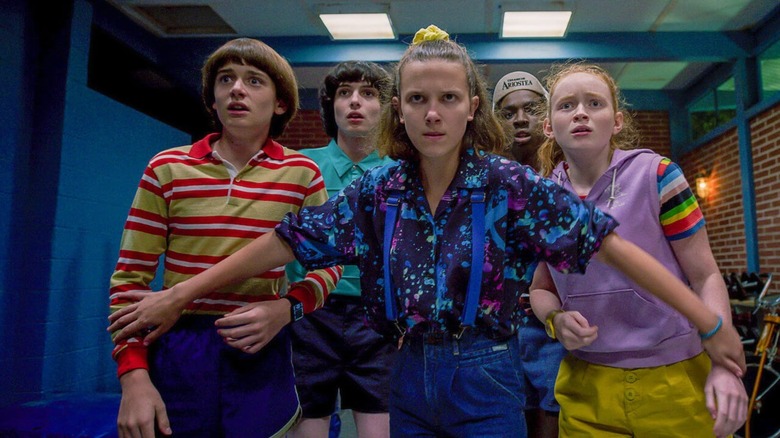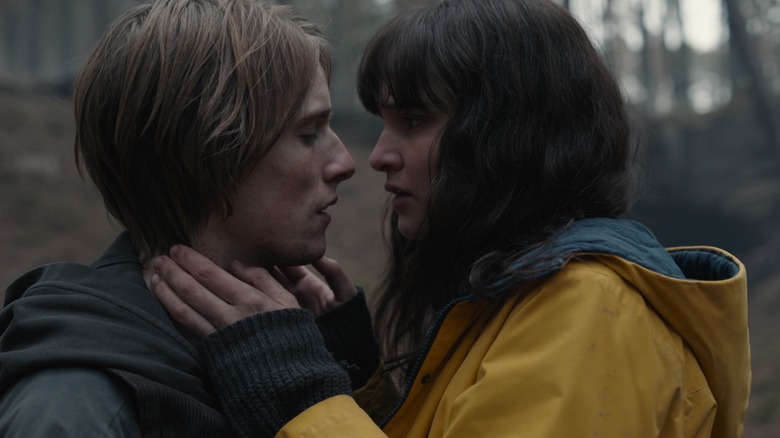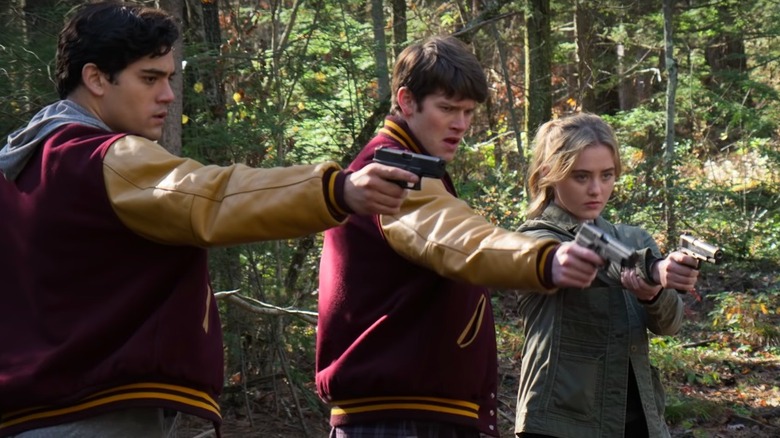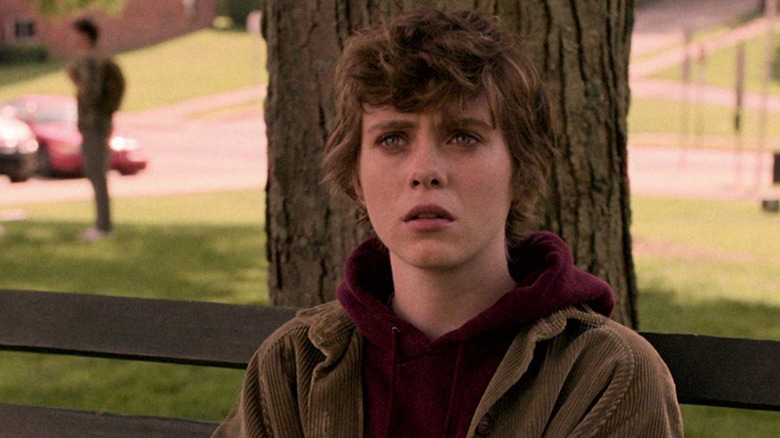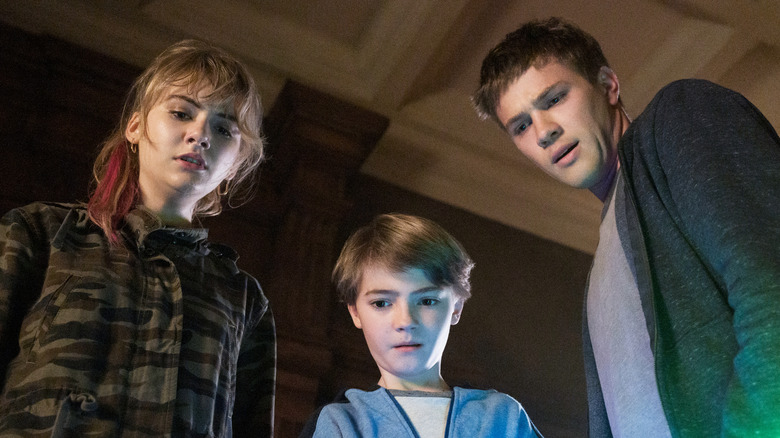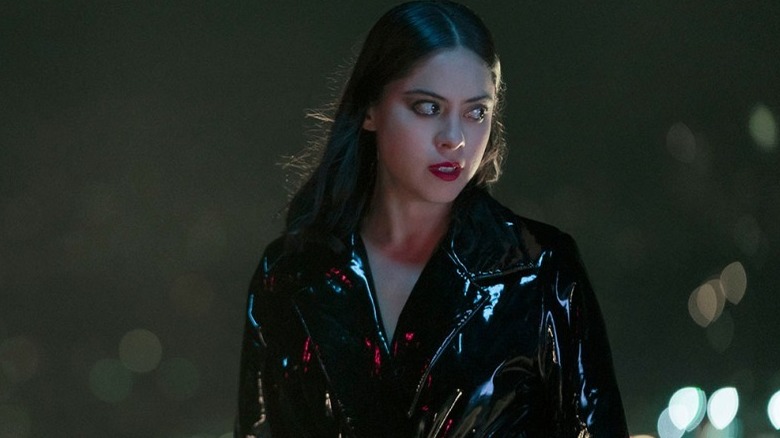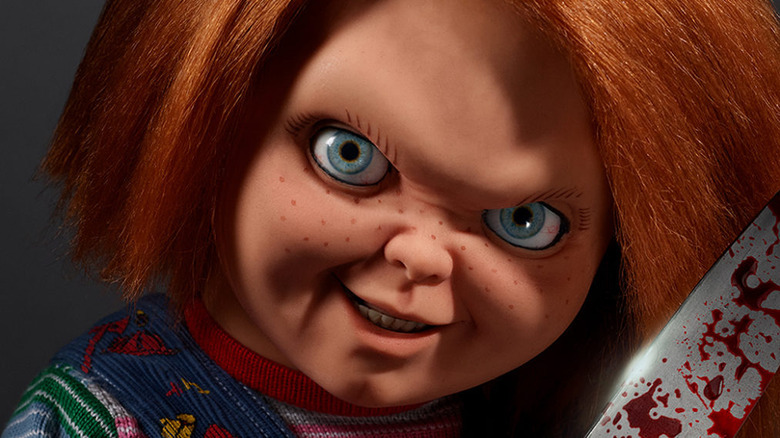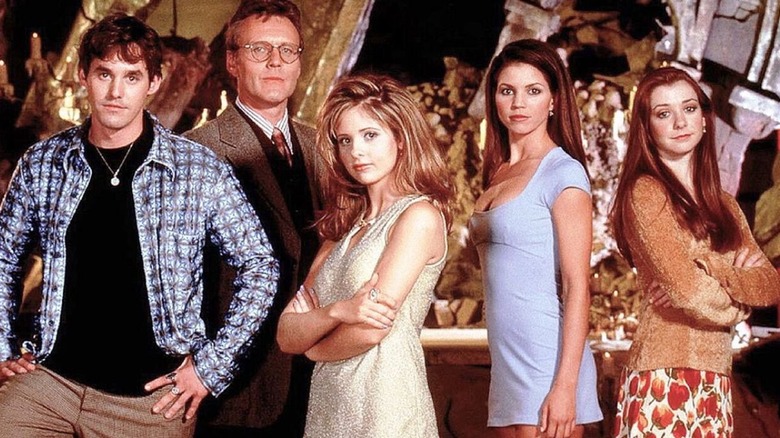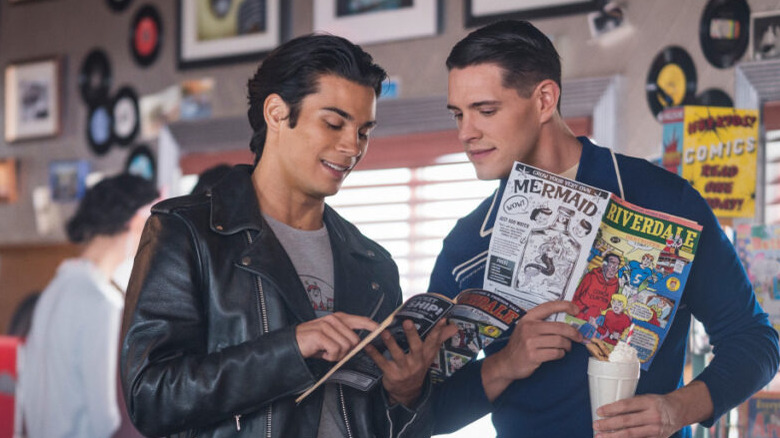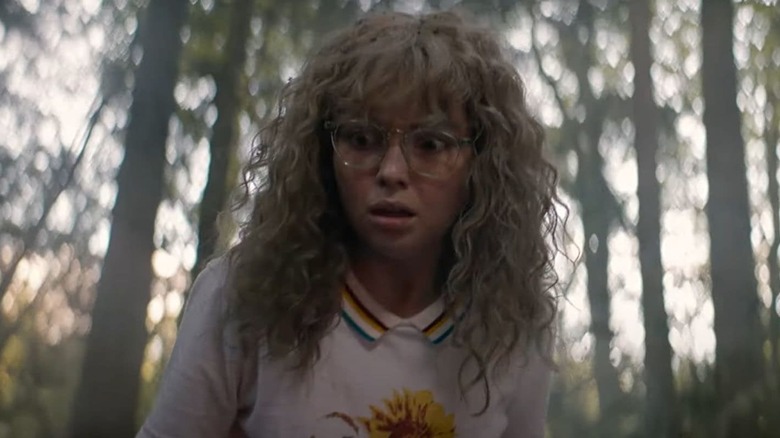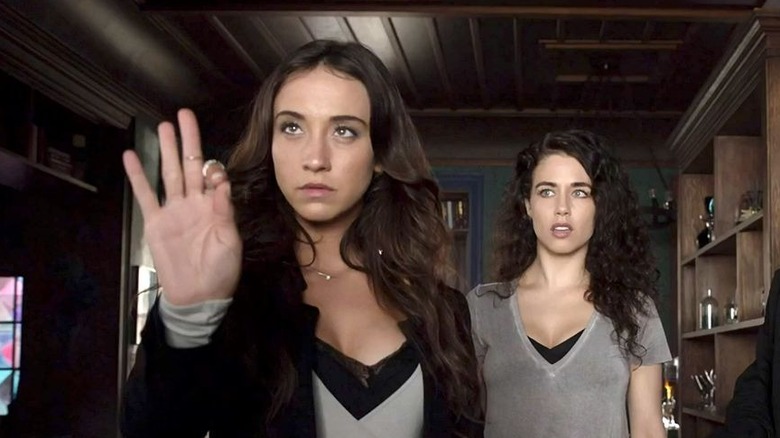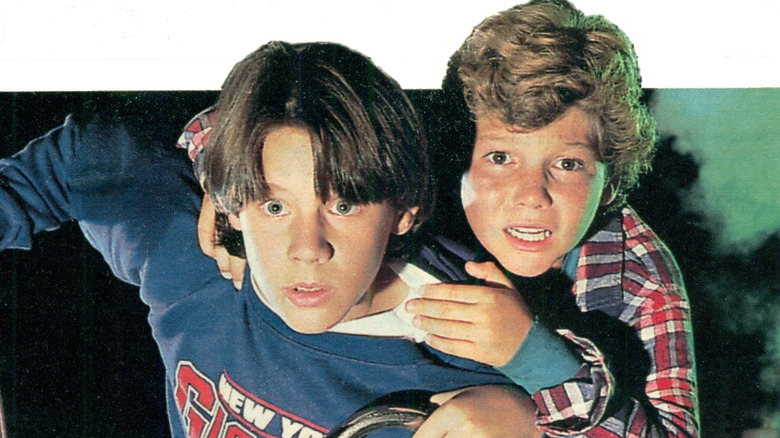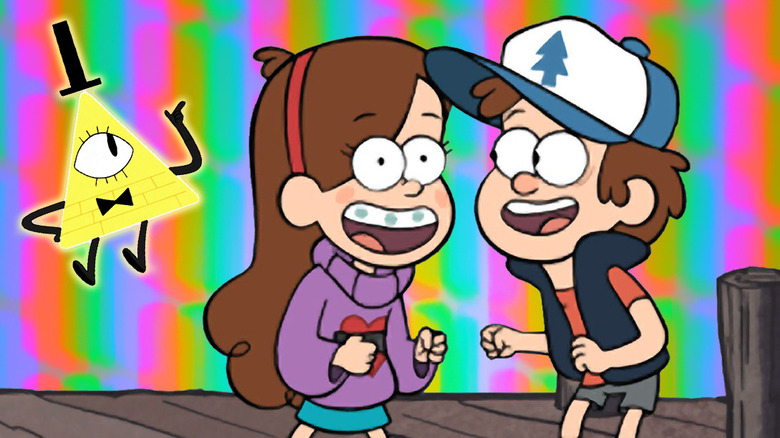12 Shows Like Stranger Things You Definitely Need To Stream
When the Ghostbusters made their return to movie theaters last November, many noted a "Stranger Things" influence on the proceedings, from the film's small-town setting to the presence of Finn Wolfhard. It was a full-circle moment for The Duffer Brothers' show, which dressed its protagonists as "Ghostbusters" two seasons ago. The student, it seemed, had become the teacher.
That's not entirely surprising. In a pop culture landscape increasingly bereft of original but massively popular stories, "Stranger Things" is an oasis — a show deeply indebted to influences already known and beloved that's turned them into a separate, equally celebrated enterprise. "Stranger Things" is the best-case scenario for mainstream entertainment in 2022, a program with a massive reach that incorporates an increasingly diverse crew of cast and creatives while taking massive swings for the artistic fences. We should celebrate it and signal boost shows that have followed its lead or paved the way for its success.
Here are 12 shows like "Stranger Things" that you definitely need to stream.
Dark
"Dark" is not "German 'Stranger Things;'" it isn't not that, either. The brainchild of two GFA Award winners, Netflix's international smash is also set in the 1980s, and concerns two children who go missing in a small town. And then ... well, to say any more would spoil things.
What I can offer is that "Dark," like "Stranger Things," uses its sci-fi noir trappings to both celebrate and eviscerate small-town life, all while staring down and through the lens of childhood. Being young means having blindspots. The dangers of even an idyllic existence are frequently less out of reach than one imagines until it's too late. These are concepts "Stranger Things" has explored (and even expanded, through Alexi, to the immigrant experience) but "Dark" applies them to the rose-colored glasses tint of memory, as well.
More than the Duffer Brothers hit, "Dark" converses with the past. It holds it accountable. And over the course of its three seasons, the intricate mystery box of old, new, and future horrors explodes into storytelling so complex but clearly laid out that it's nothing less than marvelous. This, like "Stranger Things," is a show whose nostalgic bent is weaponized for good. Savor it accordingly.
The Society
COVID-19 took so much and so many from our world that it feels silly to mourn a television show it ended — but I genuinely miss "The Society," which was set to receive a second season on Netflix before the pandemic got it canceled. At its best, the show resembled a cross between The CW's most soapy dramas and HBO's "The Leftovers."
Ridiculous? Kind of. But only kind of. The story of Connecticut high schoolers who return from their hiking trip to find all their town's adults missing, "The Society" proved that growing up and aging are chillingly separate concepts. Some characters are quick to do the former. Others flounder so totally that they become pariahs in a world barely structured enough to exile them.
It all comes together in the Qui Nguyen penned "Allie's Rules," which time jumps five months past a game-changing event to reveal the uneasy peace these teenagers have settled into together. It feels young yet ancient. There's a sense of playing dress-up, but the kind that grown-ups have when they remember everyone is faking it until they make it. And when the episode bakes a keenly observed domestic abuse drama into its stunning twists of plot, "The Society" reveals itself as a show that could have gone anywhere with a story both new and achingly familiar — because we know what it's like to uneasily start the world over again. That's what COVID gave us.
I Am Not Okay With This
If you saw a trailer for "I Am Not Okay With This" and thought it only got green-lit because of "Stranger Things," that's understandable. The one-and-done Netflix show also arrives at the cross-section of supernatural and adolescence. In its pilot, Sydney (played by a revelatory Sophia Lillis) begins manifesting strange powers. Tellingly, though, those skills are inherently connected to her excess range and grief — she makes a jock's nose bleed somehow in a moment of mourning, and an argument with her mother makes the wall crack behind her. "I Am Not Okay With This," then, is more concerned with the map of Sydney's heart than world-building mythology. And this becomes clearer as the show's LGBTQ focus comes into sharper relief, unfolding a series of authentically awkward yet tenderly realized story beats with ease and charm. "I Am Not Okay With This" might have gotten canceled because it wasn't enough like "Stranger Things," but that's zero reason to miss it.
Locke & Key
Joe Hills's Dark Horse comic "Locke & Key" felt like a spiritual sequel to his father's legendary "It," a comic that explored youth and supernatural menace with its sense of wonder unblemished. The Netflix adaptation, however, scales back that menace a bit. To be clear, it's still the story of three siblings who move into a house with reality-bending keys after their parent's murder. It's just a lighter spin on "reality-bending keys" and "parents murder."
That's not a bad thing. Every generation deserves great "gateway horror" pieces, movies and shows that are authentically frightening but palatable for young audiences all the while. 2019's "Scary Stories To Tell In The Dark" is a leading film contender on this front. "Stranger Things" holds court on the small screen. And "Locke & Key" is an even more deliberately adolescent addition to the canon, particularly in its fun but tonally messy first season. The show's darker, 2020 installment suggests it's on a path to nail-biting suspense and nihilism in season number three. That's a place some viewers won't want to tread, but if they enjoy how "Stranger Things" finds room for raucous comedy amongst its many Upside Down excursions, "Locke & Key" is the path to gently take them there.
Blood Red Cherry Flavor
By contrast, there is nothing gentle about "Blood Red Cherry Flavor." Nothing. Nothing whatsoever. Adapted from Todd Grimson's cult novel by "Channel Zero" maestros Nick Antosca and Lenore Zion, "Blood Red Cherry Flavor" tells the story of a young director who moves to LA then quickly cuts the brakes on said story in favor of supernatural kittens, hitmen, and zombies — to name just a few of the elements at play here.
If "Stranger Things" orchestrates its horror in the form of purposefully staged and executed set pieces, "Brand New Cherry Flavor" feels conducted with artistic but deranged abandon. At no point does any twist feel off of the table.
That's actually why "Stranger Things" fans should watch it. There is a method to the madness of "Blood Red Cherry Flavor," and seeing it laid out in full is a referendum on just how elegant The Duffer Brothers show frequently is. It's a reappreciation of their craftsmanship through contrast. Beyond that, though, are the incredible performances that anchor "Blood Red Cherry Flavor," particularly Rose Salazar's, which should be in any awards conversation which happens this year. It isn't subtle, but — like the show it's taken from — that's entirely what makes it special.
Chucky
I'm not sure who had "USA and SyFy's 'Chucky' series will be one of 2021's best TV shows" on their vision board, but I'd personally like to thank them. What could have been a glib reboot or dulled-edge port of Don Mancini's film series was, instead, an absolute revelation.
That's in no small part because Mancini himself is involved. His "Chucky" films have, as time's gone on, become more surreal, savage, and progressive — 2017's "Cult of Chucky," for example, deploys dizzyingly gory deaths in the name of spoofing the horror genre's proclivity for contrivance and re-traumatizing its protagonists. But it has less on its mind than the 2021 series, which all but pits Chucky against Gen Z and the parents who raise them equally. The show takes no prisoners, from a satire or slasher perspective. It remains as queer and meta as the movies which preceded it, and fans of "Stranger Things" 1980s film homages will thrill to see an '80s horror icon thriving in our modern age. It's a twisted vision, but one that's gloriously realized.
Buffy The Vampire Slayer
"Stranger Things" doesn't make it to TV without "Buffy The Vampire Slayer." Almost no show on this list does. With every passing year, Joss Whedon's seminal WB show feels more essential to TV history (even as Whedon becomes more problematic), a text that's the root of a whole programming family tree. The question isn't whether it's worth watching. The question is why it's worth watching for "Stranger Things" fans.
In a phrase? To know the show's history. The Duffer Brothers, like so many TV horror creators, owe a debt to "Buffy The Vampire Slayer," and that becomes increasingly clear if one watches the shows in tandem. Finn and Eleven's season three romantic drama, in particular, riffs on the intersections of paranormal and post-puberty that "Buffy" would so often. It's no wonder the show's titles sequences got mashed up so successfully. "Stranger Things" and "Buffy The Vampire Slayer" are inextricably in concert and, like most music shows, they're more fun when it's a double bill.
Riverdale
For anyone who thinks the plot of "Stranger Things" has threatened to jump the shark, it's time to read a real tweet from DisscussingFilm/Variety about the CW's long-running "Riverdale." You might want to sit down first. "After the entire town joined together to cut out Archie's heart in a ritual sacrifice in a mysterious alternate reality," the tweet reads, "showrunner Roberto Aguirre-Sacasa says 'RIVERDALE' Season 6 will "let the supernatural creep in a little bit more."
A little more? "Riverdale" is already dallying with the supernatural. It's made a storytelling blood pact with the gonzo and the ridiculous and decided to work around wildness rather than build up to it. That, in fact, is the show's core appeal. What began as a post-modern riff on "Archie" comics has become a riff on itself. No show is in dialogue with its own self-created zeitgeist more than "Riverdale." It knows what its fans want. It then subverts or meets those expectations in the most off-the-chain possible ways with alacrity. "Stranger Things" fans who need a new sensation to lose themselves in between installments couldn't pick a show with a larger fandom or more jaw-dropping je ne sais quoi than this one.
Yellowjackets
"Yellowjackets" is a decidedly more adult show than "Stranger Things." It's also more pointedly tapped into high school dynamics and how they haunt us into adulthood. The fact that it's both of those disparate shows is the key to its overall appeal, why it's become the sort of program sites (including ours) rush to breathlessly recap. For all the darkness "Stranger Things" seeks out in its storytelling, it never loses a sense of magic. This is the show's Amblin factor, the quality which earns it comparisons to Spielberg and Zemeckis classics (even though neither "E.T." nor "Back To The Future" took place in the Midwest).
"Yellowjackets," in contrast, posits that magic and the myths which can inform it are either long dead or scarier than any wonder is worth. We may not know what's torturing and subsequently haunting the Yellowjackets team in both the 90's and present, but it's clear that no one's swooping in to save the day. No moment of growth will come without consequences. And the birth of a child might be the most terrifying moment of any. This is the dark magic of "Yellowjackets," 2021's best new show. "Stranger Things" fans should stream it ASAP.
The Magicians
The characters of "Stranger Things" are special, their uniqueness proved through the depths of their supernatural powers or their sterling, fragile humanity. The heroes of "The Magicians," by contrast, are told they're special in school. It's not that they aren't so much as both the show and Les Grossman's series of source novels are interested in throwing them the culture of elevating the gifted under a microscope."Stranger Things" is a saga. "The Magicians" is a treatise.
Yes, ultimately the story of grad students at Brakebills College for Magical Pedagogy feels like a reaction to "Harry Potter," for adults. But like "Stranger Things," "The Magicians" also hones in on what happens when the depth of friends' gifts becomes the thing that rips them apart. There are characters in "The Magicians" who feel as left behind as Dustin and Will did in Season Three, who are unable to comprehend power as Lucas. They're proof this is a narrative that extends far beyond youth. In that sense, they serve as a complimentary cautionary tale for both "Stranger Things" and its characters. It doesn't get easier when you're older. It only gets more complicated, no matter how special you are.
Eerie, Indiana
In some ways, "Eerie Indiana" is a show that puts the kid gloves back on "Stranger Things." Airing for just one season from 1991 until 1992, the youth-focused spook show was dismissed upon initial release. But following syndication on The Disney Channel for three years, it was picked up by the Fox network for re-airing and fully cemented itself as a cult sensation. The list of credits should tell you why.
For one, "Eerie Indiana" boasts Joe Dante as a creative consultant. Few directors have ever balanced the grotesque and childlike with more glee than Dante, who never met a genre project he couldn't elevate. For another, the show was created by Jose Rivera, the first Puerto Rican screenwriter nominated for an Oscar, and Karl Schaefer, who would go on to executive produce "Z Nation" and co-create its spin-off, "Black Summer." These gentlemen have bonafides. "Eerie Indiana" is where they cut their teeth.
Like "Stranger Things," the show is made by creatives with nothing to lose and something to prove, playing in a sandbox that's as large as a child's imagination. It made a whole generation believe a show like "Stranger Things" was possible and deserves a second look.
Gravity Falls
At its core, "Stranger Things" is about how humans never stop growing up, and how the specific wonders and pains of that process are a function of the age you're living through at that moment. The mythology's the icing on the cake. For no other show on this list is this also truer than Alex Hirsch's animated masterpiece, "Gravity Falls."
I don't use the word masterpiece lightly, but "Gravity Falls" really earns the title. A heady, rollicking, side-splitting mix of "The Simpsons," "The X-Files," and "Eerie Indiana," the story of Dipper and Mabel Pines investigating Gravity Falls' mysteries explores almost every touchstone of adolescence. And when it isn't tenderly looking at how puberty warps one's sense of masculinity or unrequited love, it's building a mythos and rogues gallery of villains that's as rich as any in modern pop culture.
What's more, while "Stranger Things" has yet to reach its conclusion, "Gravity Falls" points the way towards it sticking the landing satisfyingly. It puts its characters front and center right until the end, and if "Stranger Things" follows its example, both shows will emerge as necessary tomes on how adventurous childhoods can make for more empathetic, caring adults. The world will be lucky to have both shows if yes.
